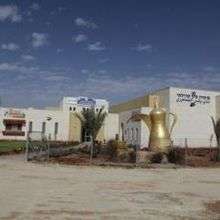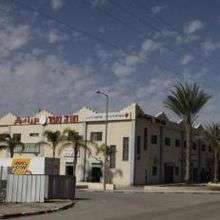Abu Alkian
The Abu Alkian bedouin[1] Arabic: أبو القيعان, Hebrew: אבו-אלקיעאן) is a Bedouin tribe living in Negev, Israel.
History
Abu Alkian Bedouin and Fellah clan arrived in Negev at the end of the 19th century. Their name translates to "Valley people".[2] Tribe leaders made an agreement with a local El Huzayil Bedouin clan and settled in the area, where kibbutz Shoval is situated today (north-west from Rahat). Abu Alkian remained there until 1956, but due to a conflict with the neighboring clan, they were forced to leave and look for a new place to live.[2] Eventually, they settled in two villages in the Yatir area the same year.
Present day

Since the end of the 1980s the major part of Abu Alkian clan - 3,200 of 4,300 people, or roughly 75 per cent (according to May 2012) - resides in their homes in a planned Bedouin township of Hura (Houra). As for the rest – around 1,000 people – they are scattered and live in two main clusters - unrecognized villages Atir and Um al-Hiran.[3]
Hura

Israel has spent tens of millions of shekels on a program to settle members of the clan in a planned neighborhood of Hura built especially for them.[3] It is one of seven Bedouin townships in the Negev desert with approved plans and developed infrastructure (other six are: Ar'arat an-Naqab (Ar'ara BaNegev), Lakiya, Shaqib al-Salam (Segev Shalom), Kuseife (Kseife), Tel as-Sabi (Tel-Sheva) and the city of Rahat, the largest among them).[4]
They were built in order to sedentarize Negev Bedouin and provide them with all the basic services, like work, education, medical infrastructure, etc. There is an industrial park in Hura, 8 schools, branches of several health funds (medical clinics), and several community centers. A number of community projects were initiated here in order to fight female unemployment.
Dispersion
About 1,000 clan members live in two unrecognized villages: Atir and Um al-Hiran. Since the municipal status of these villages is not recognized by the state, they don't have basic infrastructure: electricity supply, running water or sewerage. Abu Alkian clan members living in dispersion have been offered to move into Houra and receive different benefits, for example, land lots at low prices.[5] Nevertheless, they are reluctant to change their residence.[6]
See also
References
- ↑ Other ways to spell their name in English are: Abu al-Qi’an, Abu al-Qian, Abu Alqian or Abu Al-Qe'an
- 1 2 The Abu Alkian (Abu al-Qi’an) Bedouin clan background
- 1 2 Jack Khoury, PMO blocks recognition of Bedouin villages, November 17, 2010
- ↑ State of Israel. Ministry of Justice, Ministry of Foreign Affairs. List of Issues to be taken up in Connection with the Consideration of Israel's Fourth and Fifth Periodic Reports of Israel (CEDAW/C/ISR/4 and CEDAW/C/ISR/5)
- ↑ Clan members’ transition to the village of Houra
- ↑ The Abu Alkian Bedouin Clan
External links
- The Abu Alkian Bedouin Clan
- The Bedouin of the Negev, Israel Land Administration.
- Lands of the Negev, a short film presented by ILA describing the challenges faced in providing land management and infrastructure to the Bedouins in Israel's southern Negev region